Picture this: you’re snuggled up on the couch with your dog, and suddenly you notice her sucking on her blanket like there’s no tomorrow.
It’s a seemingly bizarre and perhaps even frustrating behavior, but in fact, many dogs love to suck on blankets, and there are good reasons for it.
You are viewing: Why Does My Dog Suck On Blankets
In this article, I’ll dive deep into the world of blanket-sucking pups and uncover the truth behind why they do it, as well as what to do if you want to try to stop it.
So grab your own cozy blanket and get ready to learn more than you ever knew was possible about this quirky canine behavior!
Reasons Why Dogs Suck on Blankets
Dogs display a wide range of behaviors, some of which can be quite puzzling to their owners.
You might say that sucking on blankets falls firmly into that category.
But while the behavior may seem strange to us, there are actually several very logical reasons why dogs do it.
#1. Puppyhood And Natural Instinct
Nursing is a reflexive behavior during the puppy stage and is essential for a puppy’s survival.
When puppies are nursing, they suckle on their mother’s teats to get milk, which provides them both with nourishment and comfort.
The instinct is so strong that some puppies may also try to suck on anything that’s in the vicinity – which can include blankets.
Then, as the dog transitions from puppyhood to adulthood, the nursing instincts might not completely go away.
As a result, she may continue to suck on her favorite soft toys or stuffed animal.
RELATED: 12 Unexpected Reasons Why Your Puppy Sleeps On Your Head

#2. Comfort And Security
Sometimes, even after weaning, a puppy may try to comfort suckle if she feels anxious or unsettled.
This can happen even when the milk supply has virtually dried up.
Similarly, sucking on blankets can be a self-soothing mechanism for puppies if they are separated from their canine mothers for any reason.
Either way, the behavior helps puppies feel safe, secure, warm, and comforted.
Not only is it inherently rewarding, but it also provides emotional support.
Some animal behavior experts suggest that dogs who suck on blankets (and other soft objects) as adults may have been deprived of adequate comfort suckling opportunities during their early development.
This can happen if the mother dog didn’t welcome their nursing attempts, was sick, the pup was separated from the litter too early and fed with a bottle, or the litter was so large the puppy did not always get adequate opportunities to suckle.
Finally, some dogs may develop an affinity for their favorite blanket, which provides them with a sense of comfort and security.
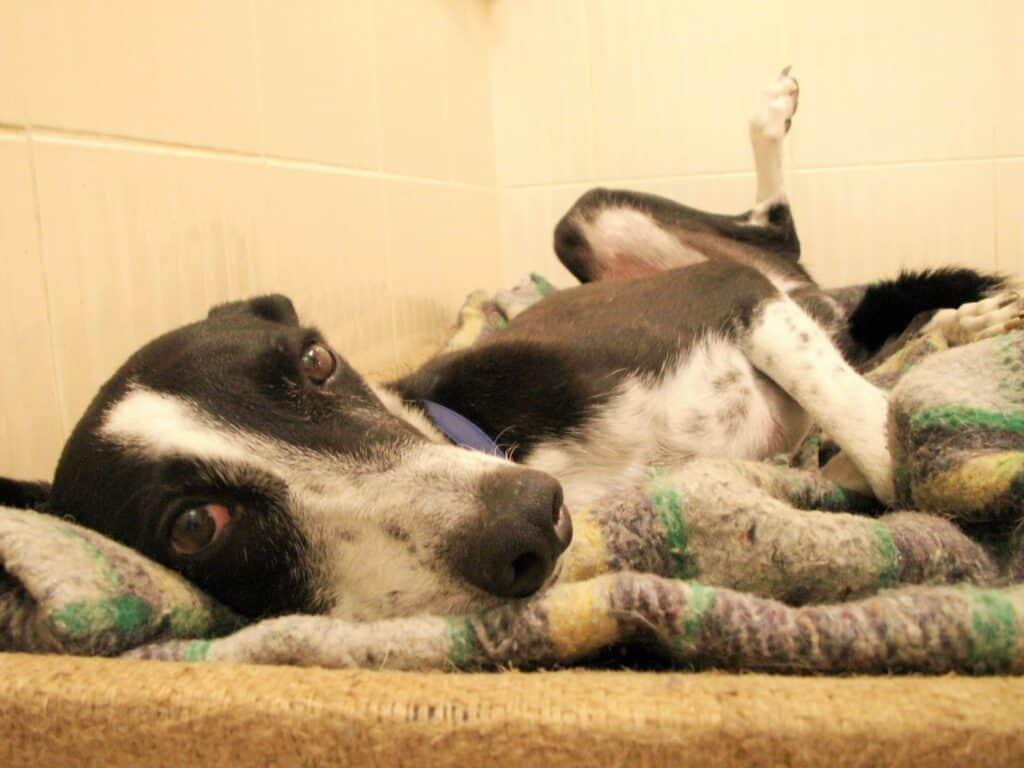
#3. Stress And Anxiety
Dogs who suffer from separation anxiety may suck on blankets as a coping mechanism when they are left alone and feel fearful, stressed, or downright panicked by their owner’s absence.
If your dog is sucking on blankets excessively, it may be a sign of an underlying emotional issue that needs the help of a canine behavior professional.
If left unaddressed, chronic stress and anxiety can pose considerable health risks to your dog.
A study by Moon-Fanelli et al. (2014) suggests that blanket sucking and flank sucking (more on that later) in Doberman Pinschers (a breed particularly susceptible to the behavior) resemble “ritualized compulsions that occurred during set times of day and in specific situations” and may be performed “as a coping strategy during periods of increased arousal or anxiety.”
The researchers note that it was not easy to discourage the dogs in the study from their sucking behaviors, which led them to suggest the behaviors may be compulsive in nature (more on that later too).
#4. Environmental Triggers
Environmental triggers can play a significant role in setting off blanket-sucking behavior in dogs.
For instance, loud noises, such as thunderstorms or fireworks, can cause some dogs to become anxious, and they may turn to sucking on blankets or soft toys as a self-calming behavior.
Visitors, especially unfamiliar ones, can also be a source of stress for dogs, leading to blanket-sucking behavior as a way to calm themselves down.
Other potential stressors include moving house, noisy construction in the home, smoke alarms, or the arrival of a baby or a new pet.
In fact, the study by Moon-Fanelli and colleagues found that increased arousal was the second most commonly reported trigger for blanket-sucking behaviors in Dobermans.
The dogs’ owners felt that situations causing increased arousal included “dog shows, kenneling, separation from [the] owner, [the] presence but unavailability of a female in estrus, ineffective attention seeking, a high level of visual stimulation, uncertainty, a new situation, a change in environment, a loud noise, or when challenged by another dog.”
So bear all this in mind.
By identifying and addressing any environmental triggers, you can better understand and support your pup and help her break the habit.
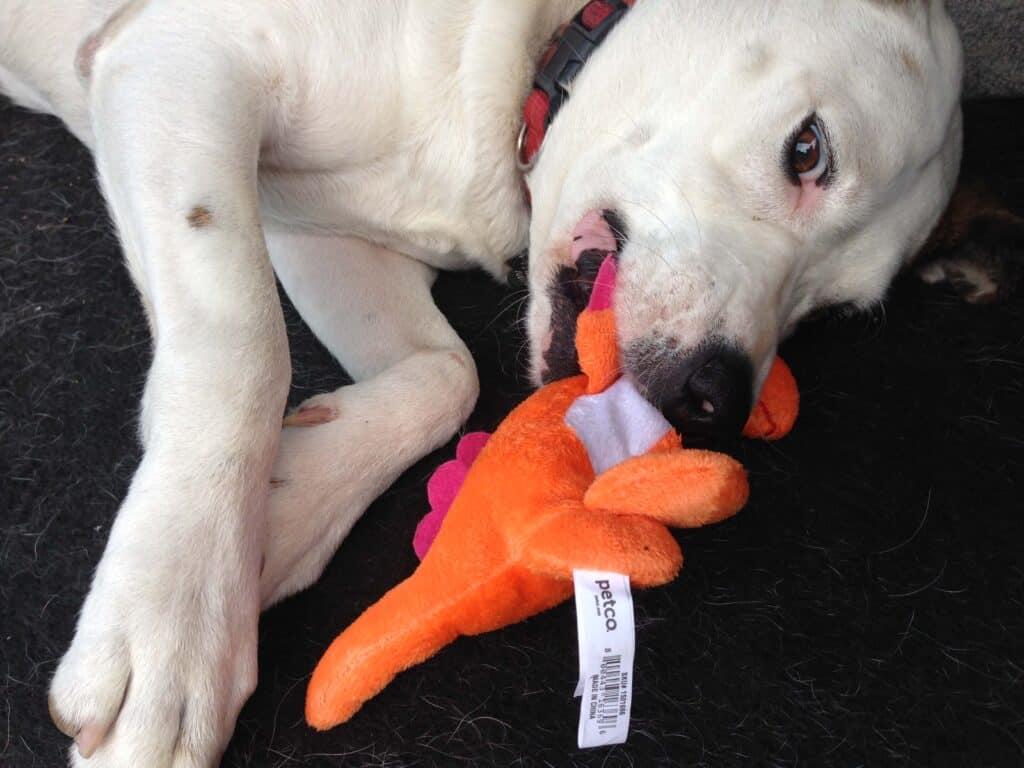
#5. Boredom
Dogs that are not getting enough exercise or physical activity may suck on blankets as a form of self-stimulation.
Why? Because when dogs are bored, they may engage in destructive or unwanted behavior.
Providing your dog with a variety of physical and mental enrichment opportunities (e.g., walks, toys, puzzles) can help to alleviate boredom and prevent destructive or unwanted behavior.
The Moon-Fanelli study found that inactivity was the most frequent trigger for blanket sucking in Dobermans “when bored, crated, at bedtime, when relaxed, cuddling with [the] owner, tired, when wakes up, after a meal, and at nighttime.”
Some of the dogs in the study would even fall asleep with fabric still in their mouths.
Read more : Why Is My Cat Suddenly Scared Of Me
RELATED: How To Stop Your Dog Chewing His Bed In His Crate (8 Expert Tips)
#6. Inadvertent Reinforcement
Don’t worry, it happens to the best of us!
You may find that you have rewarded your dog for licking or sucking on her blanket without even meaning to.
How? By giving her attention or reacting with excitement in your efforts to get her to stop.
As a result, your pup may associate her blanket-sucking behavior as a way to get your undivided attention or even start a fun game.
This means she will continue to do it and that is how positive reinforcement works.
In other words, behaviors that get rewarded get repeated. Even when it is unintentional!
To break the cycle, you need to avoid reacting in any way when your dog starts her blanket-sucking behavior.
Except to interrupt and distract her (see Train An Alternative Behavior, below).
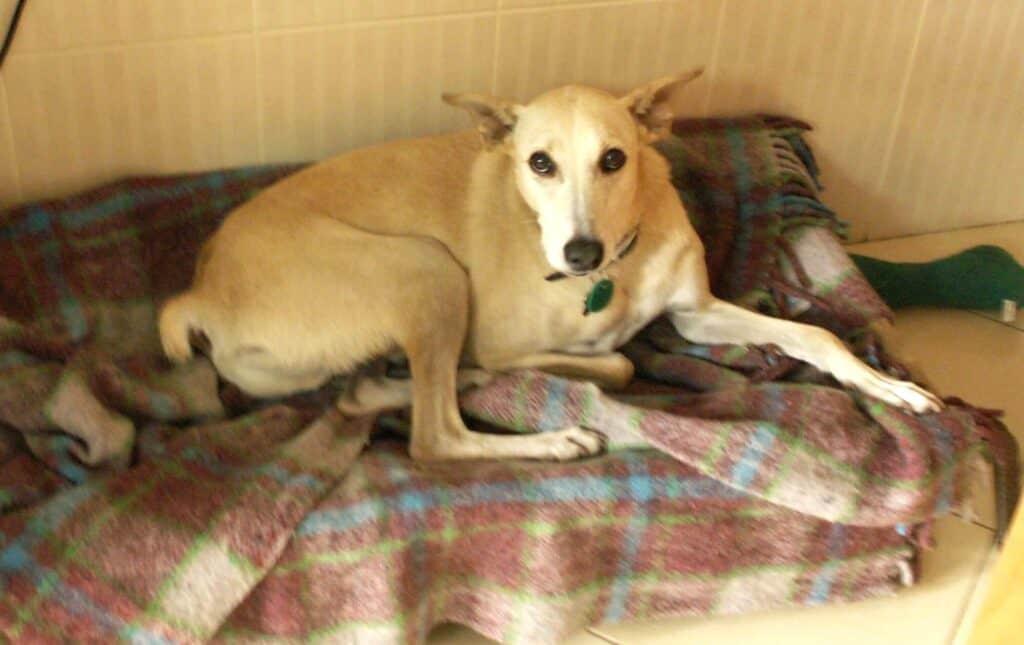
#7. Pain Relief
Just like human babies, puppies go through a teething process that can be quite uncomfortable.
Sucking on something soft, like a blanket, may help to relieve some of that discomfort and provide a little bit of relief.
Another possibility is that your dog may feel nauseous or has some kind of gastrointestinal upset, or has any kind of underlying health issue, so is sucking on a blanket to try to make herself feel a bit better.
If you suspect this might be the case, it is important to check with your veterinarian to, hopefully, rule out any serious medical issues.
#8. Pica
Pica is a condition that involves consuming non-food items.
It is not just restricted to blankets either, and can extend to other types of fabric (natural or synthetic), objects made of various materials like rubber, wood, plastic, or paper, as well as dirt, rocks, and just about anything else.
Again, pica may be caused by an underlying medical condition or a nutritional deficiency, or it may have a behavioral component.
If your dog is ingesting non-food items like this, it is important to consult with your vet.
If left untreated, pica can lead to serious health problems like gastrointestinal blockages or infections.
#9. Compulsive Behavior
Obsessive and/or compulsive disorders are characterized by repetitive and ritualistic behaviors that serve no apparent purpose.
If your dog becomes aggressive when she tries to engage in her blanket-sucking behavior, or her blanket-sucking compulsion becomes excessive or disruptive, she may be exhibiting signs of an obsessive-compulsive disorder that requires treatment.
In this case, again, it is advisable to consult with a veterinarian.
You can then develop a plan to address any underlying emotional issues and manage the behavior to improve your pup’s quality of life.
#10. Hunger
This is a long shot, but your dog may simply be hungry and seeking out a way to get more nourishment or fiber into her system.
Like licking, sucking (or suckling) is an appetitive behavior and engages the “seeking” system.
The “seeking” system refers to the part of the dog’s brain that is responsible for her natural drive to search and explore their environment.
The “seeking” system is activated when a dog is motivated to seek out and obtain something she finds rewarding, such as food, toys, or attention from her owner.
When the seeking system is engaged, it releases a chemical called dopamine in the brain, which creates feelings of pleasure and satisfaction.
Which means your dog is quite likely to continue with the behavior. Positive reinforcement, remember?
Is Blanket Sucking Harmful?
According to the American Kennel Club, occasional blanket sucking is a nominal behavior and is not considered to be harmful.
Indeed, it can be a helpful relaxation mechanism and a way for dogs to release feel-good endorphins.
However, if the behavior becomes excessive or compulsive, it can become unhealthy and destructive.
Blanket Sucking vs. Flank Sucking
Blanket sucking is a relatively common behavior among many different dog breeds.
Flank sucking, on the other hand, is a different story.
The American Kennel Club notes that while adult dogs of any breed can enjoy sucking on a blanket or soft toy, flank sucking – a behavior engaged in almost exclusively by Doberman Pinschers – can be harmful and is considered obsessive-compulsive behavior.
The study by Moon-Fanelli et al. (2014) involved 153 Dobermans, 77 with blanket- or flank-sucking behaviors, and 76 dogs who were unaffected.
“Blanket sucking and flank sucking represent aberrant forms of hard-wired ingestive behavior,” write the researchers.
“Although they differ in texture preference, both blanket sucking and flank sucking resemble suckling behavior from which they may derive. Knowing the age of weaning might shed light on the etiology and development of nonnutritive suckling.”
In other words, figuring out when a puppy stopped drinking milk from her mother might help scientists understand why some puppies and adult dogs keep sucking on things even after they stop drinking milk.
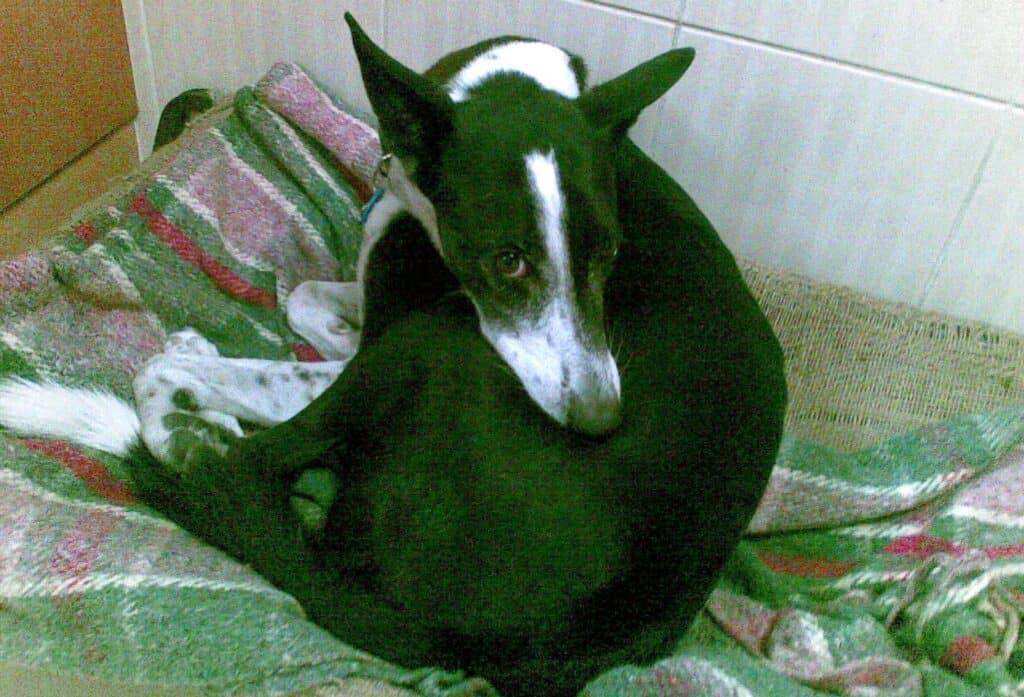
Potential Health Concerns
While blanket sucking is not necessarily harmful, it can still lead to potential health concerns.
Read more : Why Is Land So Cheap In Christmas Valley Oregon
It is important to monitor your dog’s behavior and seek veterinary care if you notice any concerning symptoms.
Dental Issues
Excessive blanket sucking can cause dental issues such as gum irritation and wear on the enamel.
This can result in pain and discomfort while eating and drinking.
Gastrointestinal Problems
Blanket sucking can also lead to gastrointestinal problems, such as vomiting and diarrhea, if your dog ingests blanket pieces or fibers.
This can cause choking hazards and blockages in the digestive tract, which can be life-threatening.
So keep an eye on your dog’s behavior and seek veterinary care if you notice any signs of gastrointestinal distress.
Hair And Skin Issues
Sometimes blanket sucking can cause hair loss around the mouth due to excessive licking and chewing.
This can also result in skin irritation and infections.
How To Stop Your Dog From Sucking On Blankets
If you’re worried about your dog’s blanket-sucking behavior, there are several things you can do to help her break the habit.
Here are some tips:
Provide Alternative Chew Toys
Dogs and puppies naturally love to chew, so provide your pup with a variety of dog chews and chew toys to redirect her attention from the blankets.
Make sure the toys are safe, durable, and appropriate for her age and size.
Train An Alternative Behavior
Teach your dog to perform an alternative behavior when she feels the urge to suck on her blanket.
It is always best to pre-empt a behavior before it even starts, so watch for the signs that your dog is about to get munching on her blanket.
If you can’t pre-empt the behavior, then you can at least interrupt it by calling her away for a yummy treat or a fun game.
Use positive reinforcement training techniques to encourage the desired behavior and discourage the unwanted behavior.
Provide A Variety Of Physical And Mental Enrichment
Dogs need plenty of physical and mental stimulation to stay happy and healthy.
Provide your dog with regular exercise, interactive toys, and food puzzle games to keep her engaged.
As well as walks, play a game of fetch or tug-of-war with your dog, or throw some treats down in the grass for her to sniff out.
RELATED: 30 Best Enrichment Toys For Dogs You Need To Know About!
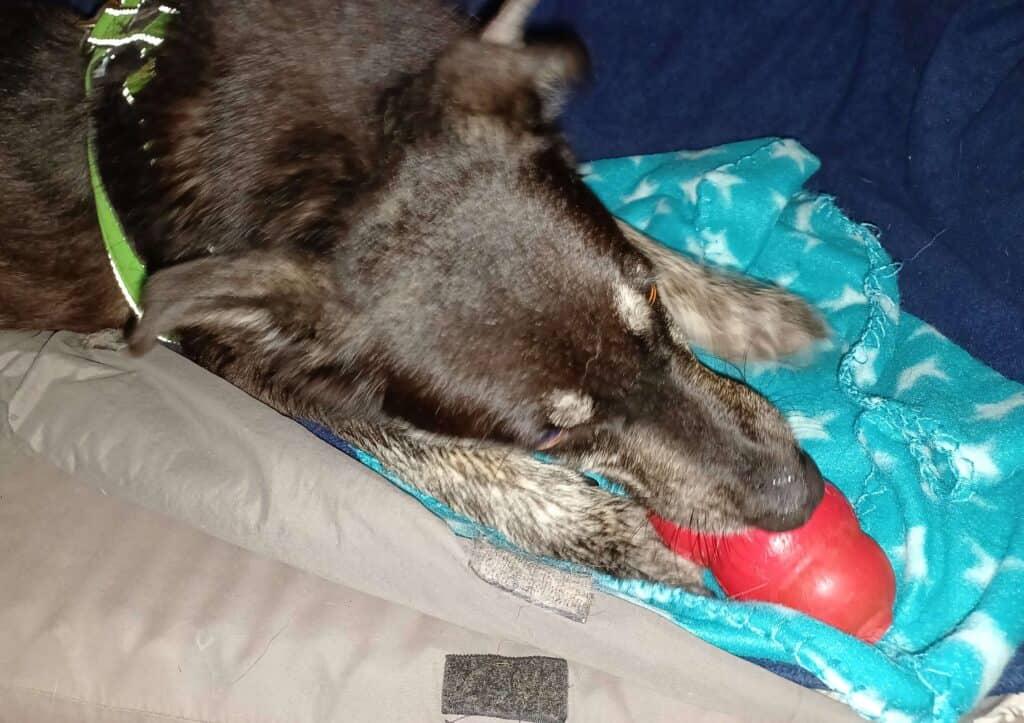
Consult With A Veterinarian
If your dog’s blanket-sucking behavior seems excessive, consult with your veterinarian to rule out any underlying medical conditions.
Once your dog is in the clear medically, you can consider the option for a behavior modification plan.
Consult With A Professional Canine Behavior Consultant
If you do decide to go down the behavior route, a professional canine behavior consultant can provide one-on-one training and behavior modification sessions to help your pup overcome the issue.
How To Prevent Blanket-Sucking Behavior In Puppies
If you have a puppy who is sucking on blankets, there are several things that you can do to prevent the behavior from becoming a habit.
Physical and Mental Stimulation
Make sure your puppy has plenty of toys to play with.
Although they need a lot of sleep and downtime, puppies also need a lot of stimulation, and toys can help to keep them occupied and prevent them from becoming bored.
Make sure that you choose toys that are age-appropriate and supervise your puppy when she is playing with them.
Restrict Activity
Don’t overdo it with the exercise.
Puppies have a lot of energy and like to play, but “excessive, prolonged activity, like jogging, can be extremely detrimental on the bones and joints of growing puppies,” says the American Kennel Club.
“This is why it is never recommended to do road work or jogging on a dog less than 14 to 18 months of age, especially large and giant breeds, until the growth plates have fully fused,” they say.
Instead, the American Kennel Club recommends walking moderately short distances of “a quarter-mile or less on softer surfaces like grass or sand until your dog has finished growing.”
Attention
Puppies need a lot of attention from their pet parent and can become anxious or bored if they are left alone for long periods of time.
Spend time playing with your puppy, petting her, and providing positive reinforcement for good behavior.
Prevent Separation Anxiety
Avoid separating your puppy from his or her littermates too early.
As I’ve already mentioned, puppies that are separated from their littermates too early may develop separation anxiety, which can lead to blanket-sucking behavior.
According to the Cornell College of Veterinary Medicine, the ideal window is between 8 and 12 weeks old.
Before You Go
Blanket-sucking behavior in dogs is a common and fascinating phenomenon that serves many functions.
But it’s not necessarily problematic and can be an entirely normal behavior for some dogs – so long as it doesn’t become excessive.
Now that you’ve got a firm handle on your dog’s blanket-sucking behavior, you might also be interested in my article Why Does My Dog Lick My Bed Sheets? (10 Surprising Reasons) for more fascinating insights into your furry friend’s behavior!
Resources
- Blanket And Flank Sucking In Doberman Pinschers – Alice A. Moon-Fanelli, Nicholas H. Dodman, & Nicole Cottam
- Flank Sucking – Gail Vetorino
- How Long Should Puppies Stay With Their Mother? – Cornell Richard P. Riney Canine Health Center
- Puppy Growth Chart: When Does My Puppy Finish Growing? – Susan Paretts
- Why Does My Dog Suck on a Blanket? – Harriet Meyers
NEED A DOG TRAINER OR BEHAVIOR EXPERT? If you need more help dealing with a training or behavior issue, please find professional help from a force-free dog trainer who can consult with you either in person or remotely. GOOD PLACES TO START ARE: – COAPE Association of Pet Behaviourists and Trainers – Pet Dog Trainers of Europe – International Companion Animal Network – Institute of Modern Dog Trainers – Pet Professional Guild All dog owners deserve to have successful relationships with their canine companions!
Source: https://t-tees.com
Category: WHY
